Intro
Nosebleeds happen suddenly due to dry air, trauma, or allergies, causing bloody noses. Understand sudden nosebleed causes, symptoms, and treatments.
Nosebleeds, also known as epistaxis, are a common condition that can occur in anyone, regardless of age or health status. They can be caused by a variety of factors, including dry air, allergies, colds, and injuries. In some cases, nosebleeds can be a sign of an underlying health issue, such as high blood pressure or a blood clotting disorder. When a nosebleed happens, it can be a frightening and unexpected experience, especially if it is severe or persistent. Understanding the causes, symptoms, and treatment options for nosebleeds can help individuals take control of their health and seek medical attention if necessary.
Nosebleeds can be classified into two main categories: anterior and posterior. Anterior nosebleeds occur in the front part of the nose and are usually caused by dry air, allergies, or minor injuries. They are often easy to treat and can be managed with simple first aid measures. Posterior nosebleeds, on the other hand, occur in the back part of the nose and are often more severe. They can be caused by high blood pressure, blood clotting disorders, or other underlying health conditions. Posterior nosebleeds require medical attention and may need to be treated with more advanced procedures.
The sudden onset of a nosebleed can be a concerning experience, especially if it is accompanied by other symptoms such as dizziness, headache, or difficulty breathing. In some cases, nosebleeds can be a sign of a more serious underlying condition, such as a tumor or a vascular malformation. If a nosebleed is severe, persistent, or recurrent, it is essential to seek medical attention to rule out any underlying health issues. A healthcare professional can evaluate the individual's overall health, perform diagnostic tests, and provide guidance on the best course of treatment.
Nosebleed Causes and Risk Factors
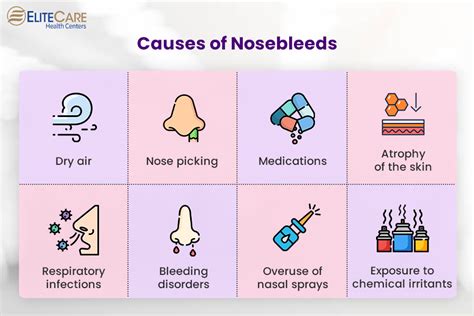
Physical factors, such as injuries or trauma, can also cause nosebleeds. A blow to the nose, a fall, or other types of physical trauma can cause blood vessels in the nose to rupture, leading to bleeding. In some cases, nosebleeds can be caused by health-related factors, such as high blood pressure, blood clotting disorders, or other underlying medical conditions. Certain medications, such as blood thinners or aspirin, can also increase the risk of nosebleeds.
Common Causes of Nosebleeds
Some of the most common causes of nosebleeds include: * Dry air * Allergies * Colds and other respiratory infections * Injuries or trauma * High blood pressure * Blood clotting disorders * Medications, such as blood thinners or aspirin * Tumors or vascular malformationsNosebleed Symptoms and Diagnosis
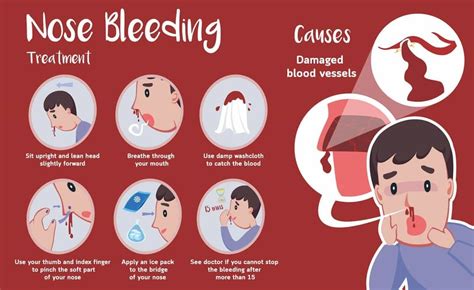
To diagnose a nosebleed, a healthcare professional will typically perform a physical examination and take a medical history. They may also perform diagnostic tests, such as a nasal endoscopy or imaging studies, to determine the cause and location of the bleeding. In some cases, a healthcare professional may need to use specialized equipment, such as a nasal speculum or a suction device, to visualize the nasal passages and control the bleeding.
Nosebleed Diagnosis and Treatment
The diagnosis and treatment of a nosebleed depend on the underlying cause and severity of the bleeding. Some common treatment options for nosebleeds include: * Applying pressure to the nose to control the bleeding * Using nasal packing or gauze to absorb the blood * Applying topical medications, such as saline or antibiotic ointments, to promote healing * Using oral medications, such as pain relievers or decongestants, to manage symptoms * Undergoing surgical procedures, such as cauterization or embolization, to control the bleedingNosebleed Prevention and Management
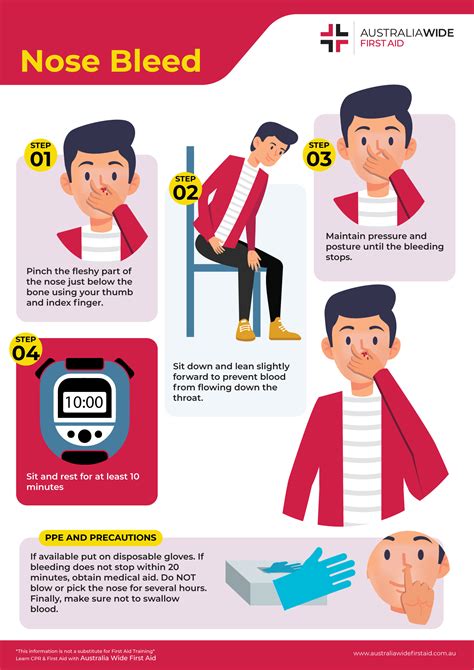
Managing a nosebleed requires prompt attention and proper care. Individuals who experience a nosebleed should:
- Remain calm and still
- Apply pressure to the nose to control the bleeding
- Use cold compresses or ice packs to reduce swelling
- Elevate the head to reduce blood flow to the nose
- Avoid blowing or picking the nose
Nosebleed Complications and Risks
Nosebleeds can be associated with several complications and risks, including: * Infection or abscess formation * Scarring or adhesions in the nasal passages * Septal perforation or deviation * Sinusitis or other respiratory infections * Anemia or blood lossNosebleed Treatment Options
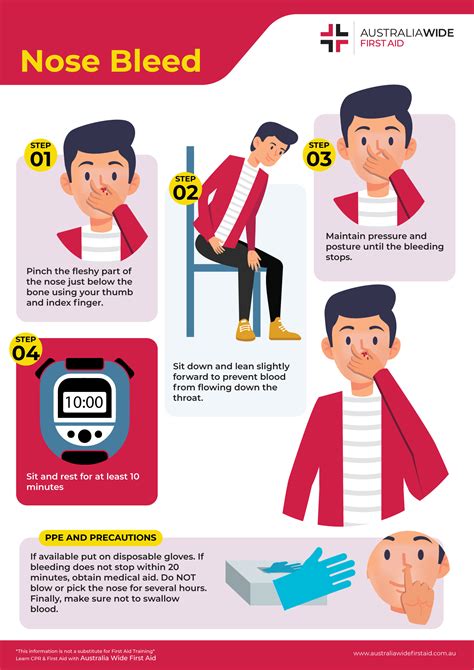
Nosebleed Surgical Procedures
In some cases, surgical procedures may be necessary to treat a nosebleed. Some common surgical procedures include: * Septoplasty: a procedure that corrects a deviated septum or other nasal abnormalities * Turbinate reduction: a procedure that reduces the size of the turbinate bones in the nasal passages * Nasal reconstruction: a procedure that repairs or rebuilds the nasal passages and surrounding tissuesNosebleed Recovery and Follow-Up
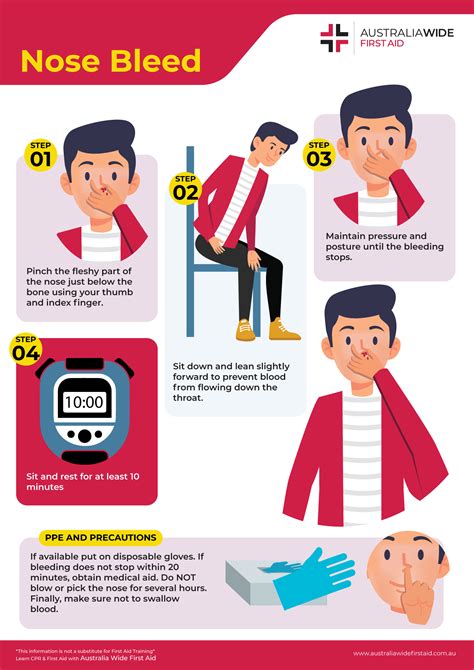
Nosebleed Follow-Up Care
Follow-up care is essential to ensure that the nosebleed has healed properly and to address any complications or concerns. Some common follow-up care strategies include: * Scheduling follow-up appointments with a healthcare professional * Monitoring the nasal passages for signs of infection or complications * Using nasal sprays or drops to promote healing and moisturize the nasal passages * Avoiding exposure to allergens or irritantsWhat are the most common causes of nosebleeds?
+Nosebleeds can be caused by a variety of factors, including dry air, allergies, colds, and injuries. They can also be caused by health-related factors, such as high blood pressure, blood clotting disorders, or other underlying medical conditions.
How can I prevent nosebleeds?
+Preventing nosebleeds can be challenging, but there are several steps that individuals can take to reduce their risk. These include using a humidifier to add moisture to the air, avoiding picking or blowing the nose, using saline nasal sprays or drops to moisturize the nasal passages, and avoiding exposure to allergens or irritants.
What are the treatment options for nosebleeds?
+The treatment options for nosebleeds depend on the underlying cause and severity of the bleeding. Some common treatment options include cauterization, embolization, nasal packing, and medications. In some cases, surgical procedures may be necessary to treat a nosebleed.
We hope this article has provided you with a comprehensive understanding of nosebleeds, their causes, symptoms, and treatment options. If you have experienced a nosebleed or are concerned about your risk of developing one, we encourage you to consult with a healthcare professional for personalized advice and care. Remember to share this article with friends and family members who may be interested in learning more about nosebleeds and how to manage them. By working together, we can promote better health and well-being for everyone.
